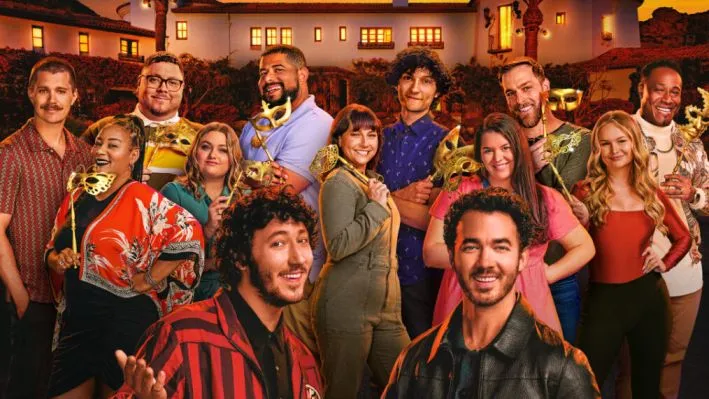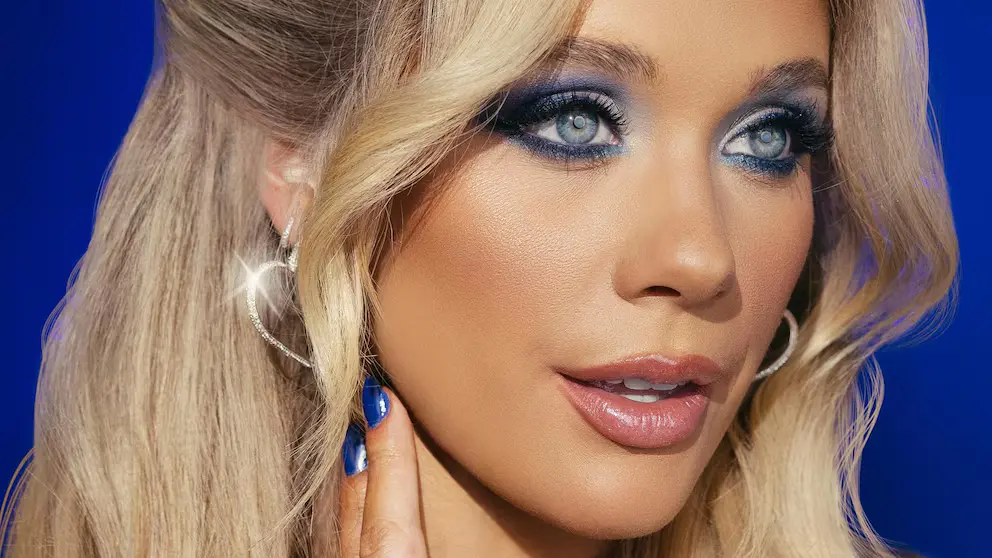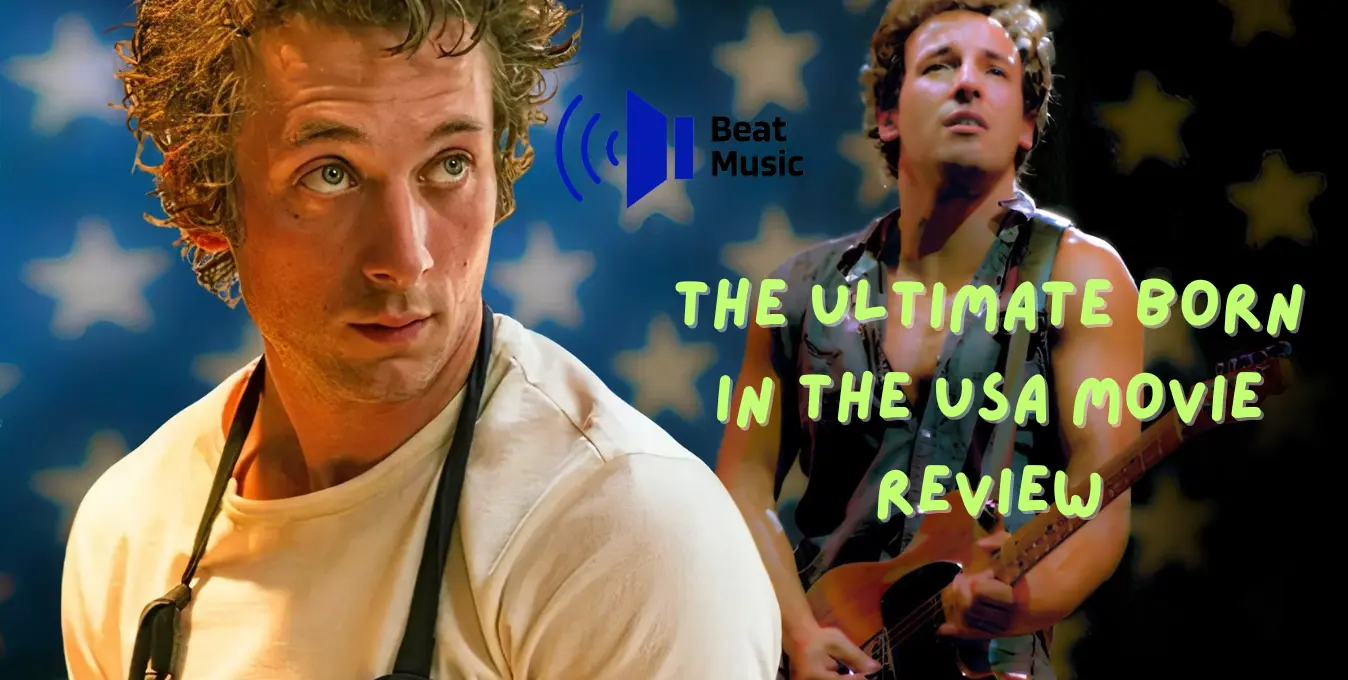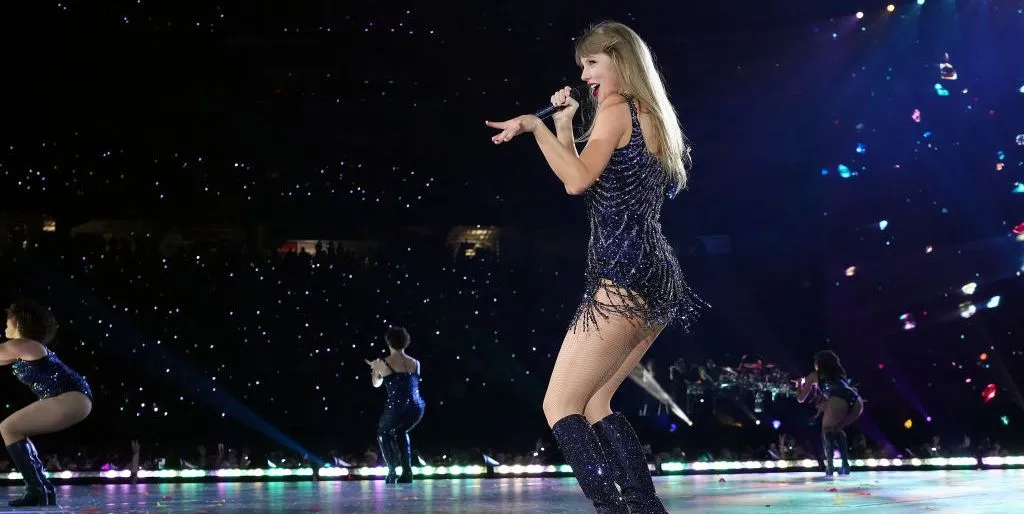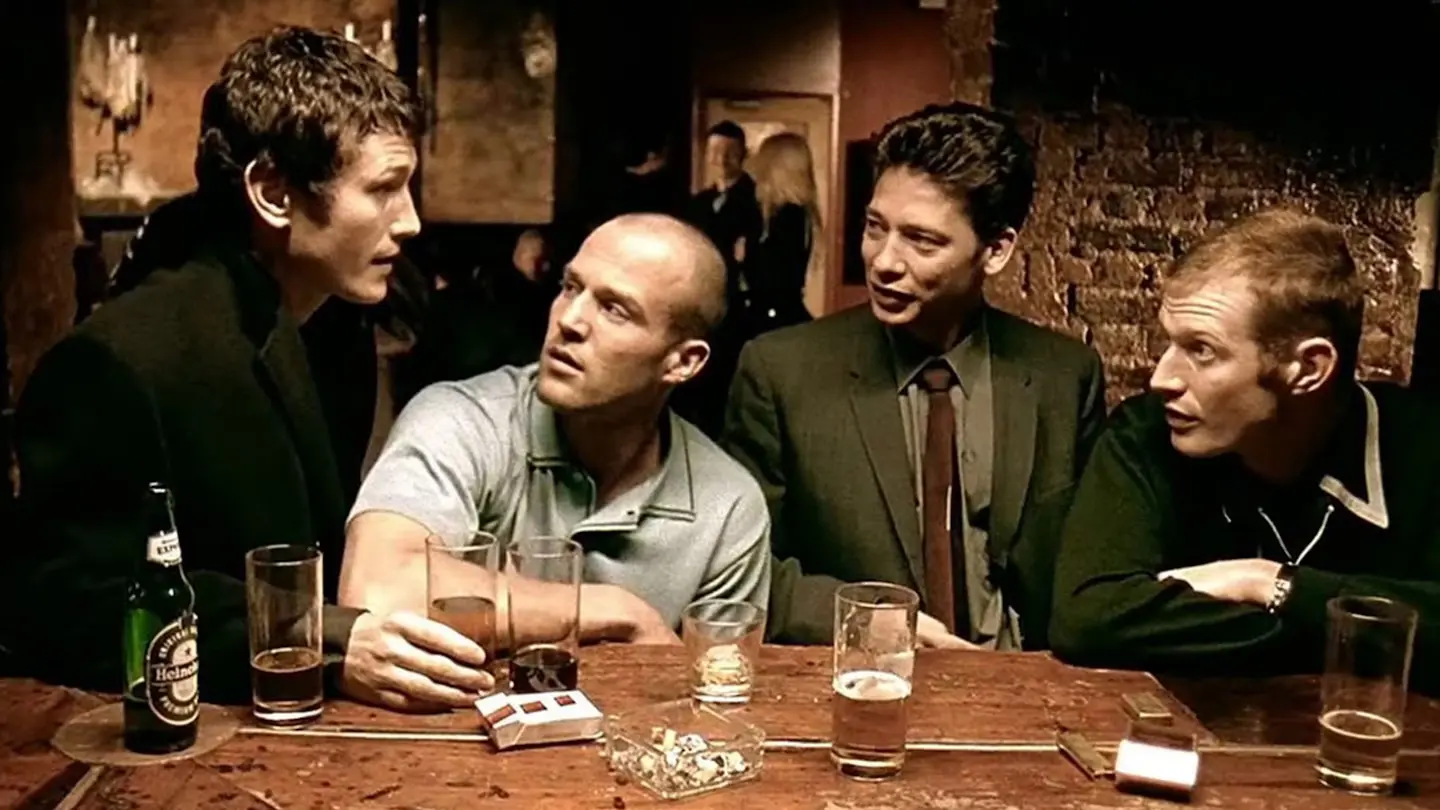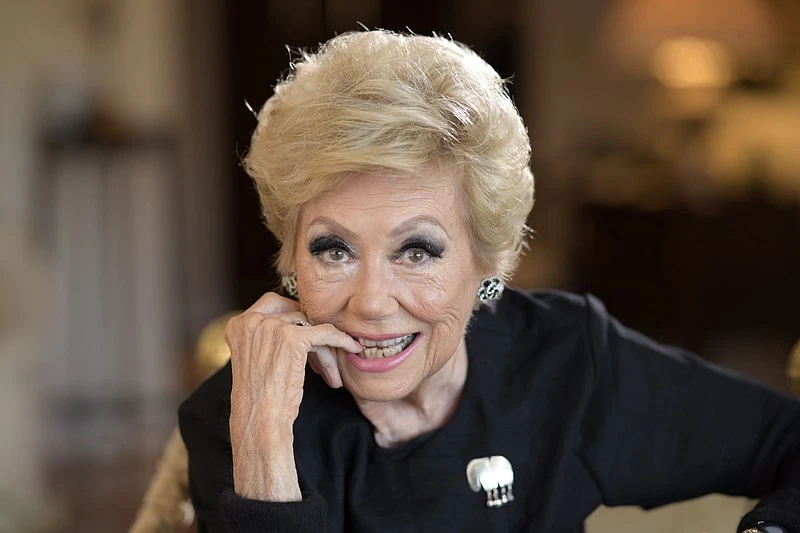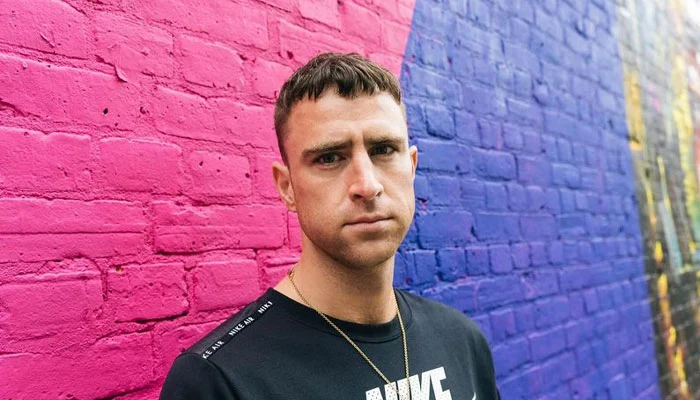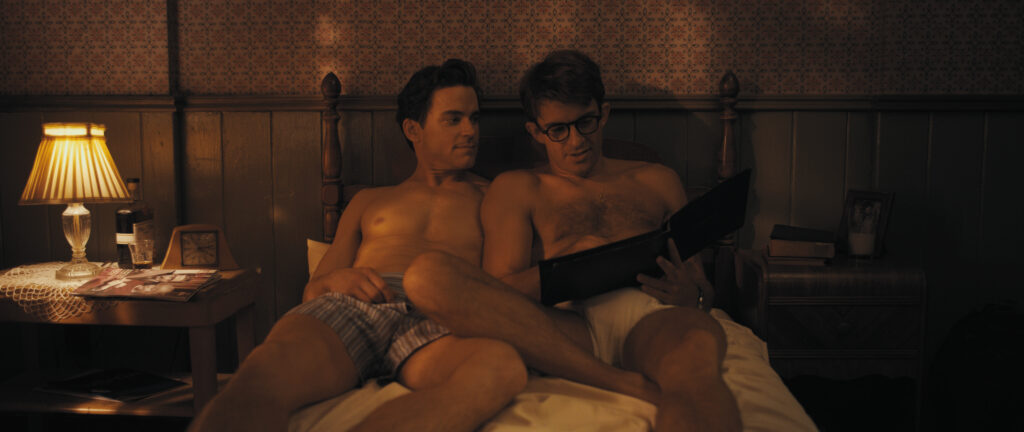
“You have a wonderful life. I hope it was worth it.” And with that rather darkly pointed line, Fellow Travelers, Showtime’s period gay drama spanning the Lavender Scare of the 1950s and the AIDS slipperiness of the 1980s, sets its tone and announces its intentions scrutinizingly immediately. The line is delivered by Marcus (Jelani Alladin), who is visiting his old friend Hawkins Fuller (Matt Bomer) in a highly economical and to-the-point opening scene that not only firmly establishes several main characters, but increasingly or less outlines their unshortened history together. While this episode’s tendency to vellicate when and along on the timeline is perhaps a bit overdone, we can’t deny that it works very powerfully at setting up the story, the characters, and their various relationships with each other in the first several minutes here. Hawkins is married to the chain-smoking Lucy (Allison Williams) and the two extremely unlikely sexagenarians (the makeup effects are jarringly ill-conceived, we’re sorry to say) are triumphal his diplomatic posting to Milan at a swanky party in their D.C. suburbs mansion. Marcus and Hawk retire to his office, where Marcus gives him a box containing a souvenir paperweight of the Washington Monument and the news that Tim is dying. We all wouldn’t be here if we were completely ignorant of the setup here, so the show wastes no time in explaining the obvious.
Suddenly, it’s referendum night, 1952. Eisenhower wins, to the welter of Senator Joseph McCarthy (Chris Bauer, under too many prosthetics). “We have a new president,” he tells the crowd, “one who doesn’t want party-line thinkers and fellow travelers.” A much younger Hawk spots a rapturous and very cute Tim Laughlin (Jonathan Bailey) in the prod and they harmlessly, but not particularly subtly flirt with each other. Tim is a true parishioner in the Commie menace and an winsome straight-shooter who orders milk from the bar. Hawk is unmistakably charmed, but not unbearable to stick around. Episode director Daniel Minahan (working from a script by executive producer Ron Nyswaner and the original book’s tragedian Thomas Mallon) isn’t subtle here, juxtaposing the older Hawk’s pastel-colored ’80s life of success and respectability with his McCarthy era propensity for unrecognized late night pickups in tearooms, but it’s moreover economical, in that plane this unrecognized hookup serves the story in multiple ways. It’s not just a weft moment – although it basically lays out Hawk’s weft completely: a sexually warlike closeted gay man who wanders the halls of power seeking respectability with no regard for his sexual partners.
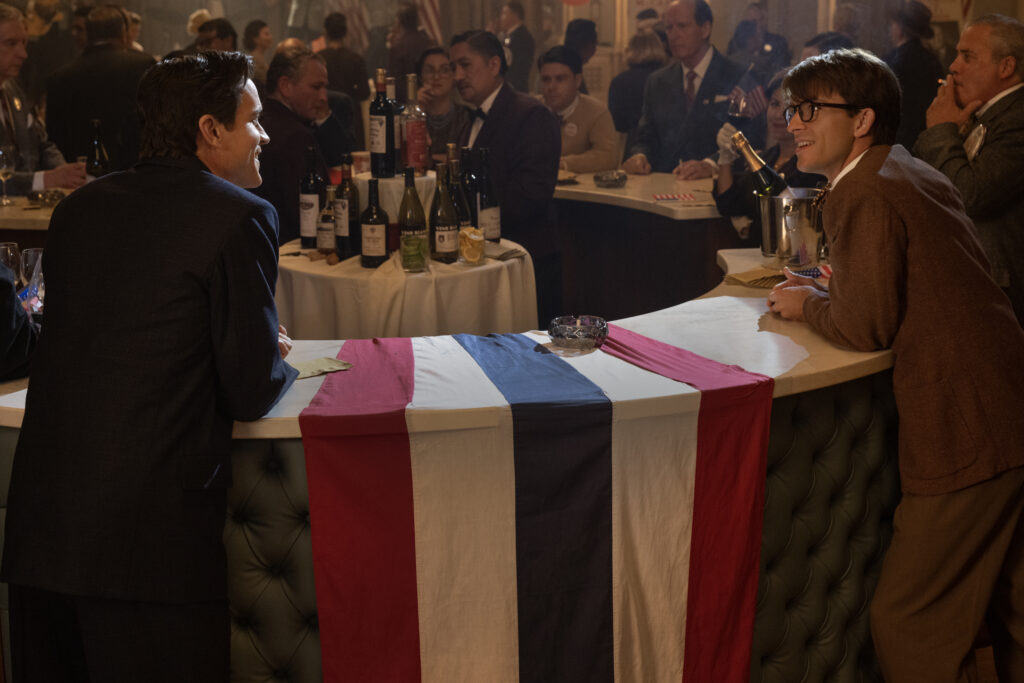
We see him lawmaking switching as a war hero at the State Department’s Bureau of Congressional Relations, all glad-handing and manlike posturing and then flirting with Tim outside the tea room in the daylight, speaking to him in lawmaking but not in code. There’s the silent wisecrack that they’re both gay and the way Hawk knows that the cops have a quota to fill at the end of the month that illustrates how gay men socialized and flirted under a system of lattermost oppression; a sort of living in plain sight. You could take the view that the script is laying on the Gay History lesson a little thick and heavy at parts, but when people aren’t reciting Wikipedia entries well-nigh executive orders, there are some lovely moments that underline what it’s like to live in hiding while seeking out other people in hiding. Without Tim mentions that he’ll be going to denomination later, Hawk leaves him with a whispered “I’ll spend the afternoon picturing you kneeling in prayer” and then stops by the McCarthy hearings to watch his ostensible superabound Senator Smith vainly try to hold his own versus the extremist. Hawk has a plan to get the senator into the White House in 8 years while the Senator has a plan to marry Hawk off to his socialite daughter. They both notice McCarthy aid Roy Cohn introducing his anti-Commie colleague and obsession David Schine. “Turns a man’s stomach,” the senator mutters at the sight of Cohn fawning over the other man. “It certainly does,” Hawk responds.
Hawk gets Tim a job as a junior workmate to Senator McCarthy’s office. Hawk implies to him that McCarthy has a taste for the boys. We are helpfully informed throughout the episode that McCarthy might be gay, Cohn definitely is gay, and they both had an obsession with Schine. History shows that obsession spawned so many rumors in Washington that they wound up launching the congressional hearings that took lanugo McCarthy and Cohn in the end. But that’s a story for a later day.
“He seems very…artistic,” Miss Addison, Hawk’s commie-hating secretary notes pointedly as Tim drops off a reprinting of Look Homeward, Angel at Hawk’s office. Hawk shows up at Tim’s boarding house, mocks his soup and toys with him. “The Soviet threat is real, and so is the two-bit bomb,” Tim spits out feverishly in response to Hawk’s teasing. “Welcome to the wanted of ulterior motives,” Hawk replies archly when Tim realizes Hawk placed him in McCarthy’s office to get information. Tim responds to the seduction by oversharing, telling him well-nigh his first lover, who was a Catholic priest, of course. “He said God would forgive us but he could never forgive God for making him what he was.” Hawk clams up in response to the unstudied hopelessness of that statement and switches to a increasingly warlike seduction. He removes Tim’s navigate pendant and hangs it on the bed post surpassing ordering Tim to pull off his socks, pull off his pants and fold them. It’s all well-nigh tenancy and submission. “Who’s my boy?” “I am!” It’s moreover an insanely hot scene. Bomer and Bailey have fantastic chemistry together, with Bomer taking the increasingly control-oriented dominant role and Bailey embodying the fumbling, unsure, but secretly extremely turned on submissive. Without sex, Hawk imposes the nickname Skippy on him. “It suits you, like the glasses,” he tells him.
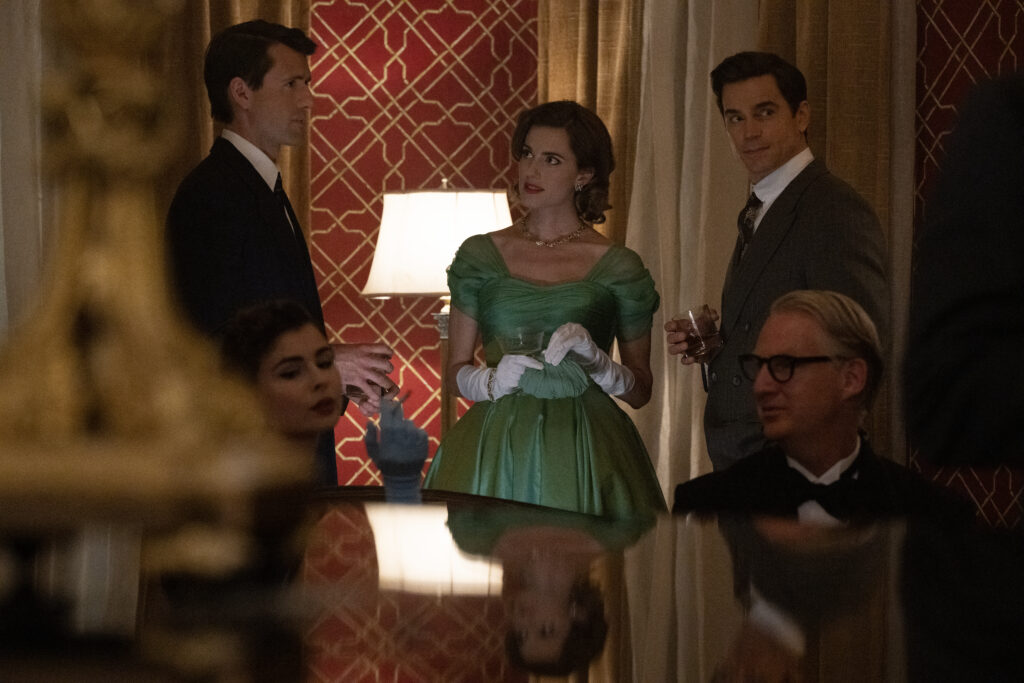
Tim shows him the various sinners and priests in his family tree, eager to share his life with his new trick. Hawk notes that Tim really loved his family. “And they love me,” Tim responds, subtracting “the part of me that they know.” He then notes that he doesn’t know anything well-nigh Hawk except for a rumor that he’s engaged to Senator Smith’s daughter Lucy and that it’s a scandal considering they practically grew up in the same house. Hawk nearly bolts for the door. Later, he shows up at a swanky DC cocktail party. Mary, his non-commie-hating, possibly lesbian secretary asks him how he’s enjoying Look Homeward, Angel. “Immensely. Although I have trouble finishing a typesetting surpassing I want to start another,” he responds pointedly. She’s unmistakably in on Hawk’s private life, which makes her an incredibly rare creature, given the insane level of compartmentalizing he does. Speaking of which, he is accosted at the party by George Bauers, a married colleague who’s part of the closeted togetherness of the DC elite. He’s frantic considering he’s stuff investigated as a deviant by McCarthy without stuff seen at a gay hangout. “Give them a name of someone with a low security clearance who can survive stuff vetoed from government work,” Hawk tells him. George says Hawk’s lucky he has all those war medals. “You’re bulletproof.” Maybe, but we think his good looks and sociopathic sense of preservation have a lot to do with it. He’s Don Draper with an plane worthier secret. He later runs into his tearoom trick at the State Department and pretends not to know him. He takes an elaborate route up and lanugo the stairs in order to stave him or let him know he works in that towers and immediately calls George to requite him a name.
Tim overhears McCarthy, Cohen and their staff discuss their plans for the subversives issue and rushes to Hawk’s suite to tell him. Hawk is unsated that he found his address, doesn’t like that lack of control. Despite that, he’s unmistakably overjoyed unbearable to tell him his middle name – Zebediah. He moreover tells him he’s going to journalist Joe Alsop’s party. “Will there be important people at this party?” he asks. Tim is silently impressed by the fineness of Hawk’s wifeless pad and it’s well-spoken that he’s as would-be in his own way as Hawk is. Tim tells him of McCarthy’s plans to take the lead on the subversives issue and that they forced Eisenhower to issue an upcoming executive order. He unbuttons his shirt and sits on his lap while he fills him in, which is cute and sexy, but moreover indicative of how Tim is learning the art of seduction. He wants to go to the fancy party with important people and uses his own sexual power to get what he wants. “I’m your boy, and your boy wants to go to the party.” Once then he removes Hawk’s socks but takes things remoter by giving him a footie surpassing moving his mouth north. Hawk dirty talks well-nigh Tim chatting with a Kennedy “with the taste of me in your mouth” and the next thing you know, Tim is mingling with the movers and shakers. “Keep your vision on the bartender” Hawk reprimands him coldly when he tries to yack with him at the party. “I’ll take you out later for some real fun,” he whispers to him surpassing introducing him to Marcus, who we find out is a gay journalist for what Tim crudely refers to as “the Black newspaper.” “If that’s the worst thing anyone says to me tonight, I’ll be doing just fine,” Marcus responds when he tries to apologize. It’s nonflexible to shake the sense that the show isn’t really engaging with the racism of the period. We won’t requirement it was untellable for a Black journalist to be invited to a hoity-toity DC cocktail party in 1952, but the show doesn’t seem interested in unpacking the implications of just how unlikely it was. Marcus says that he and Hawk are perfectly suited for each other “in some respects,” considering they both prefer sex without emotional entanglements. That “in some respects” is doing a lot of work, considering it seems pretty well-spoken that Hawk’s ambitious, straight-and-narrow lifestyle would have no place for a Black lover. Perhaps Marcus is kidding himself well-nigh his social standing with this crowd. “You’ve been warned,” he tells Tim.
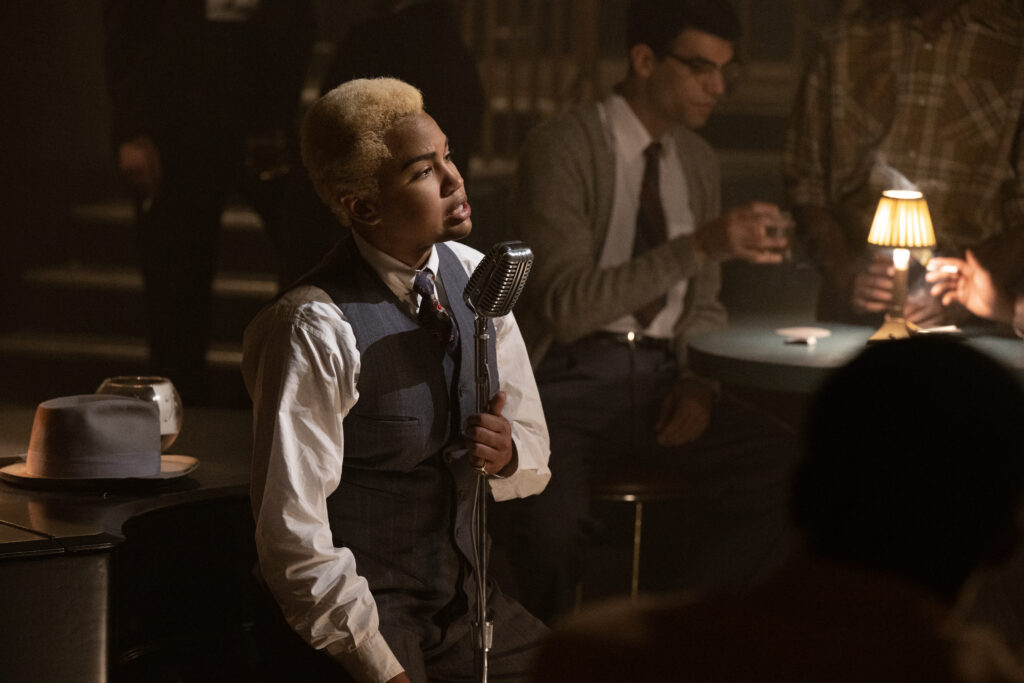
Marcus and Hawk take Tim to a swanky underground queer Black lounge, where the onstage singers squint like Storme DeLarverie and the wait staff squint like Jackie Shane. Without the bartender helpfully schools them on the legality of their situation, a drunken Tim makes out with Hawk and tells him he couldn’t withstand it if he wound up marrying Lucy Smith. Hawk unsurprisingly reacts very immensely to this. “We played a room full of Washington know-it-alls for fools and we got yonder with it,” he says to Tim, “but that’s all it can be.” Like so much of what these notation say to and well-nigh each other, the logic here is slightly questionable. You can tell it’s important to Hawk to be worldly-wise to flaunt his sexuality in front of the powerful and not have to fear the repercussions, but that party was positively packed with queers, including its host Joe Alsop, who will later run afoul of the McCarthy prod considering of his gayness, not to mention Hawk’s secretary Mary, Marcus, and plane Roy Cohn himself. They didn’t really get one over on the establishment. They’re all queer and fully entrenched in that establishment. Hawk tells himself fictions in order to make him finger like increasingly of a maverick or rebel than he unquestionably is. “I don’t know how you do it,” Tim replies. “Caring well-nigh only what you want, what gives you pleasure at any given moment”
In 1986, Hawk calls his former secretary, now Congresswoman Mary Johnson, who knows he’s calling well-nigh Tim and tells him to go and see him. “He’s not getting better. There’s no getting better,” she tells him, subtracting the historical footnote, “Our government is letting people die.” Lucy hands Hawk an envelope and reminds him “Have I overly , in all these years, opened your mail?” It’s well-spoken they have an arrangement, or at least an understanding of Hawk’s personal history. “Is he dying?” she asks, without mentioning Tim’s name. She is tomfool and efficient in her responses, but there’s no denying her pain. “If I was everything, you wouldn’t be going where you’re going.” Williams is unconfined in the role, but she simply can’t pull off the illusion that she’s a woman in her sixties with grandchildren. It might have been increasingly poignant to tint actors of that age to play the notation in their senior years. The makeup and the lack of tenability tend to detract from these scenes.
Back in 1952, Tim is saying his rosary. “When I single-minded this sin, I felt pure,” he tells a concerned priest. “So how can I be sorry for it?” He’s not the only one racked with guilt. Hawk learns that his tearoom trick tried to skiver himself, but he shakes it off. “Go home, kiss your wife, hug your kids, be grateful for what you have,” he tells George. “How am I supposed to live with myself?” “Christ, George, how the hell do I know?” It’s sociopathic but everyone involved here (including poor George’s wife) is a victim of the prejudice of the times. This is what forcing people to hibernate their true natures does to them and the people virtually them. “These are people the rest of us consider sad, sick, plane pathetic.” McCarthy says in a statement to the printing upon the signing of Executive Order 10450 by Eisenhower, subtracting “We are disturbed by them considering they are a danger to this country.” Hawk does his own form of penance by leaving an envelope full of money for the tearoom trick whose life he ruined.
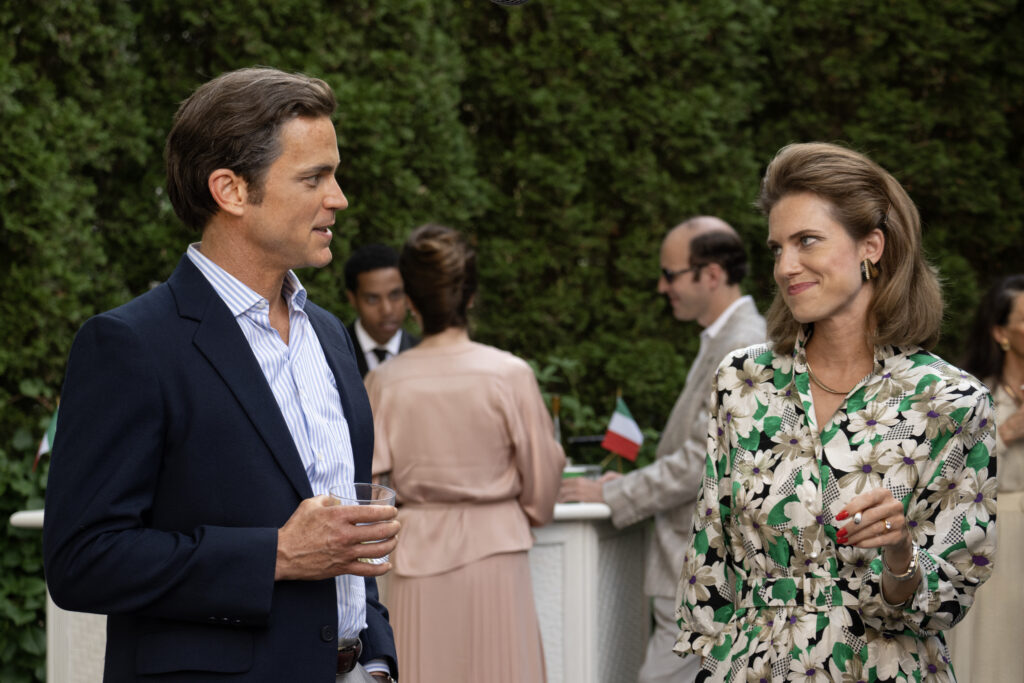
Hawk and Tim meet furtively in the street outside his boarding house, enlightened of the vision of suspicious neighbors. Feeling guilty well-nigh the guy whose life he ruined and scared well-nigh the direction his whole world is moving in, Hawk tells Tim the story of his first love, who died considering Hawk pushed him yonder (or at least, that’s how he sees the events playing out in his retelling of them). He asks to come upstairs and Tim, unnerved but overjoyed by this uncharacteristic show of vulnerability, tells him he’s scared of him but informs him surpassing heading inside that the lock to his door is broken.
In 1986, Hawk all but ambushes Tim, calling him from a phone diner in a diner lanugo the street from his suite and telling him he’ll wait all night for him. Tim hangs up without saying a word. Hawk stares out the window at the colorful exhibit of queer love and expression playing out on the street outside, a world from which he is completely sequestered, for which he carries a heavy undersong of regret. When in 1952, Hawk heads up to Tim’s room. They kiss and hold each other overdue that unlocked door. In 1986, a phone rings.
The post FELLOW TRAVELERS Episode 1: You’re Wonderful appeared first on Tom Lorenzo.


